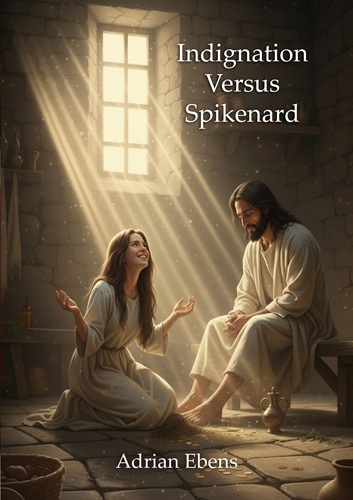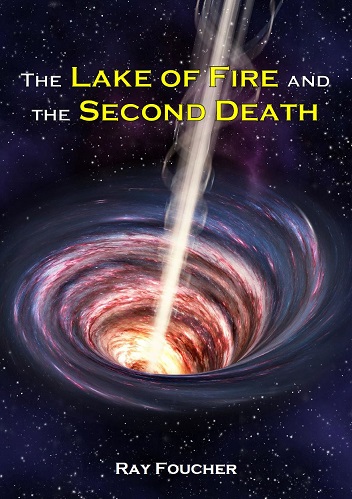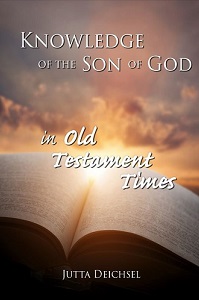What Shall Be the End of the Ungodly
What Shall Be the End of the Ungodly?
The Present Truth 19, 32.
August 6, 1903
"A few weeks ago the Christian published a criticism of Mr. R. J. Campbell, on account of his unscriptural teaching that all men will ultimately be saved. The writer of the criticism, however, acknowledges that the doctrine that he himself is upholding,-everlasting torment,-is a 'terrible one,' if there no escape from universalism on the one hand or eternal torment on the other? Must one of these doctrines necessarily be the truth? Or have we any scriptural ground for believing in the annihilation of those who will not receive salvation through the atonement?"
The best answer that can be given to this question is to give a plain, straightforward, although necessarily brief exposition of the Scripture teaching concerning the atonement. It is not by any means as complicated as theologians have made it, but is so simple that a child can understand it; and when we once understand it, all difficulty as to universalism and eternal torment will vanish.
"The redemption that is in Christ Jesus," is comprehensive enough to include the whole human race, as will presently be made plain; but God, who sees the end from the beginning, has made known to us the sad fact that many souls will go to destruction because they will not walk the way of life. Christ says: "Enter ye in at the strait gate; for wide is the gate, and broad is the way, that leadeth to destruction, and many there be which go in thereat; because strait is the gate, and narrow is the way, which leadeth unto life, and few there be that find it." Matt. vii. 13, 14. These words occur in Christ's "sermon on the mount," which even infidels often profess to accept as a perfect standard; they require no explanation, for nobody can misunderstand their meaning; they are only to be believed or disbelieved; but whoever believes them cannot believe in universal salvation; and, on the other hand, whoever believes in universalism thereby shows that he does not accept the teaching of Christ.
Shall we have a few more texts before we take up the principles of the atonement? In the twenty-fourth and twenty-fifth chapters of Matthew we have one of the last talks that Christ had with His disciples before His crucifixion. It was but the week before He was betrayed. It is wholly concerning His second coming, and at the close He describes the two classes that will be on earth when He shall come: those who have served Him, and those who have not. "And these," He says, speaking of those who have not followed Him, "shall go away into everlasting punishment; but the righteous into life eternal." Matt. xxv. 46.
Now we want to know what this everlasting punishment will be, and we read the words of the Apostle Paul, with reference to the second coming of Christ. He says that "the Lord Jesus shall be revealed from heaven with His mighty angels, in flaming fire taking vengeance on them that know not God, and that obey not the Gospel of our Lord Jesus Christ; who shall be punished with everlasting destruction from the presence of the Lord, and from the glory of His power." 2 Thess. i. 7-9. The punishment is to be everlasting, it is true, but it will be destruction; and this is emphasised in Rom. vi. 23, where we read: "The wages of sin is death; but the gift of God is eternal life through Jesus Christ our Lord." "The soul that sinneth, it shall die." Eze. xviii. 4. Thus we see that the punishment is death; and since the punishment is to be everlasting, it will be everlasting death-death from which there will be no resurrection. {August 6, 1903 EJW, PTUK 499.5}
Bear in mind that this death, which is the wages of sin, is the direct opposite of life. It is not eternal life in torment, for life, no matter what its conditions, is not death in any sense. The righteous, who have the gift of life, often suffer grievous affliction; but they are alive, and not dead. Death means cessation of existence, even as God said through His prophet: "All the heathen . . . shall be as though they had not been." Obadiah 16.
So we read again: "The wicked shall perish, and the enemies of the Lord shall be as the fat of lambs; they shall consume; into smoke shall they consume away." "For evil doers shall be cut off; but those that wait upon the Lord, they shall inherit the earth. For yet a little while, and the wicked shall not be; yea, thou shalt diligently consider his place, and it shall not be. But the meek shall inherit the earth; and shall delight themselves in the abundance of peace." "Mark the perfect man, and behold the upright; for the end of that man is peace. But the transgressors shall be destroyed together; the end [future] of the wicked shall be cut off." Ps. xxxvii. 9, 10, 20, 37, 38.
We cannot suppose that men who stand as preachers are ignorant of these statements of Scripture, and many more like them; therefore we are obliged to suppose that they ignore them. But if one is to follow one's own mind, regardless of what the Bible says, one should announce that fact, and not preface one's sermons with texts of Scripture. The texts that we have quoted make it very plain that there is a middle ground between universalism on the one hand, and eternal torment on the other. We will now turn our attention to the foundation principles which make all these statements plain.
It should not be overlooked, that the root of all this difficulty is the unscriptural idea that man is by nature deathless,-that God, having once given him life, cannot withdraw it. Many sincere Christians hold this idea, seemingly wholly unconscious of the fact that it was the serpent who said to Eve, "Ye shall not surely die," in direct contradiction of God's declaration that they should surely die if they disregarded His commandment. To say that man cannot die, is to say that God spoke falsely, and that the devil told the truth. It is this grave error that has led to all others. Believing it, one is forced to accept either universalism or eternal torment. Believing the Word of God, one is not involved in any difficulty whatever.
An expression that occurs several times in the thirty-seventh psalm will give us a starting point. Evildoers shall be cut off;" "they that be cursed of Him shall be cut off;" "the end of the wicked shall be cut off." The question is, "From what shall they be cut off?" It is evident that they will be cut off from that with which they have been connected; and one needs only to use the faculties that God has given him, to know that all men, whether good or bad, exist solely because of their connection with the life of God, given them in Christ. "For in Him we live, and move, and have our being;" "for we are also His offspring." Acts xvii. 28. No one can keep himself alive for a single minute. If God thought only of Himself, "if He gather unto Himself His Spirit and His breath, all flesh shall' perish together, and man shall turn again unto dust." Job xxxiv. 14, 15. {August 6, 1903 EJW, PTUK 499.10}
In the beginning "the Lord God formed man of the dust of the ground, and breathed into his nostrils the breath of life; and man became a living, soul." Gen. ii. 7. "The Spirit of God hath made me, and the breath of the Almighty hath given me life." Job xxxiii. 4. The Spirit of God in our nostrils (Job xxvii. 3) is what alone keeps us from returning to the condition of non-existence; that is, to the condition that was when we were not. Recall the statement in Obadiah, that those who know not God "shall be as though they had not been."
Jesus Christ is the living bread that came down from heaven, to give life to the world. John. vi. 51. He is "the way the truth, and the life." John xiv. 6: There is no life in the universe except the life of God in Christ. God is our dwelling place, as He has been in all generations. Ps. xc. 1. "In His hand is the soul of every living thing, and the breath of all mankind." Job xii. 10. God is; that is His name, His distinctive title; He is the only one of whom it can be absolutely said that He is; all others have existence only by being in Him. Although God gave man dominion over the earth, he had that dominion only as he acknowledged his absolute dependence on God. Assuming himself able to live and reign alone, he fell, and lost the dominion. God is "above all, and through all, and in all" (Eph. iv. 6); but in the fall man cast off his allegiance to God, asserting his right and power to live independently. This is what constituted the fall.
If God had at once taken man at his word, and had allowed him to go his own way from the beginning of the rebellion on earth, man would at once have ceased to be. But God "is long-suffering to usward, not willing that any should perish, but that all should come to repentance." 2 Peter iii. 9. He is liberally long-suffering: He is love, and love suffers long, and is kind. God bears the earth, and all its inhabitants, with all their sins and sicknesses. Thus He actually suffers in the sins and sorrows of mankind. Isa. xliii. 24; liii. 4, 5. The cross on Calvary is a demonstration of this; it shows what God has suffered ever since sin entered into the world.
Although men believe not, yet God abides faithful; He cannot deny Himself. 2 Tim. ii. 13. So although men have cast off allegiance to Him, denying that they live by Him, or owe Him anything; some even denying that there is a God; He patiently waits and supplies them with His own life, in order that they may repent of their rebellion, and return to their allegiance to Him. He forces none to come into subjection to Him, but gently and quietly draws all by the power of His love.
But there comes a time at last when it is useless to wait longer. Christ comes the second time to earth, not as before in humiliation, but in power and great glory. "Every eye shall see Him," and nobody will need any proof that He is Lord of all. Every knee will bow to Him, and every tongue will confess that God is, and that Jesus Christ is Lord. Rom xiv. 2; Phil. ii. 10, 11. But even then the wicked will continue to do wickedly. Still they will say, "We will not have this man to reign over us." They acknowledge that God is just; but they hate justice. They still desire to have nothing to do with Him, and insist that they are competent to manage their own affairs. So presumptuous are they,-so blinded by the Deceiver,-that they will undertake even to cast God down from His throne, and to seize upon His place. Ps. ii. 1-6; Rev. xx. 7-9. Then at Iast God will take them at their own word, and will allow them to try their idea of existing wholly separate from Him. There can be but one result, namely, extinction; for in the first place it is impossible for any creature to live a moment without God's sustaining power, and in the second place, there is no place where men can go away from God. God fills all space, so that the wicked must go into nothingness, where there is no place, in order to set up their independent kingdom. Literally, their place shall not be.
Now it must be apparent to all that there is no injustice in this, and that it is also perfectly consistent with everlasting love; because it is only giving to men what they have worked for, and what they have persisted in having. It certainly would be no kindness to rebellious haters of God, to compel them to live with Him. If there were a place in the universe where God is not, the wicked, who hate His presence, might be sent there to live if they could; but there is no such place, and they can have their hearts' desire only by going out of existence. God's mercy endures for ever, even in the complete destruction of the wicked.
Thus it appears that the extinction of the incorrigibly wicked is a necessary part of the atonement. For the atonement contemplates the extermination, the blotting out of sin; and when sin is completely blotted from God's universe, those who have so fully identified themselves with sin that they are nothing but sin, must be blotted out with it.
Nor does this fact that there will be incorrigibly wicked men at the last, indicate the least defect in the atonement; it does not show any weakness on God's part. On the contrary, it shows how firmly God has maintained His original purpose of having an earth filled with righteousness, and ruled over by absolutely free men. Man has his choice, either to reign with God in life, or to ally himself with Satan in death; and in the Judgment every lost sinner will acknowledge that God is clear of his blood, since He has made ample provision for the salvation of all. The wicked will fall by their own counsel; they will be self-condemned and self-destroyed. The strong shall be as tow, and his work a spark, and they shall burn together (Isa. ii. 31); "for the turning away of the simple shall slay them, and the prosperity of fools shall destroy them." Prov. i. 32. And then when sin and sinners shall have been blotted from God's creation, from every part of it only one song will be heard, of blessing, and honour, and glory, and power, unto Him that sitteth on the throne, and unto the lamb for ever and ever.




